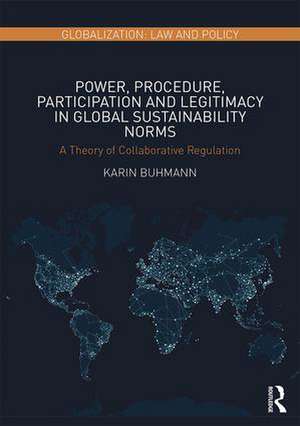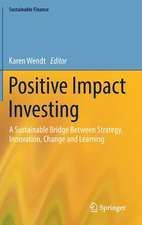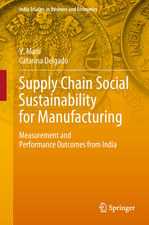Power, Procedure, Participation and Legitimacy in Global Sustainability Norms: A Theory of Collaborative Regulation: Globalization: Law and Policy
Autor Karin Buhmannen Limba Engleză Hardback – 2 aug 2017
This book responds to that need. Based on empirical experience on public-private regulation of global sustainability concerns and theoretical perspectives on transnational regulation, the book proposes a new theory on collaborative regulation. This theory sets out a procedural approach for multi-stakeholder regulation of global sustainability issues in a global legal and political order to provide for legitimacy of process and results. It takes account of the claims to participation of the private sector as well as civil society organisations and the need to balance power disparities.
| Toate formatele și edițiile | Preț | Express |
|---|---|---|
| Paperback (1) | 281.67 lei 6-8 săpt. | |
| Taylor & Francis – 22 mar 2019 | 281.67 lei 6-8 săpt. | |
| Hardback (1) | 1000.27 lei 6-8 săpt. | |
| Taylor & Francis – 2 aug 2017 | 1000.27 lei 6-8 săpt. |
Preț: 1000.27 lei
Preț vechi: 1219.84 lei
-18% Nou
Puncte Express: 1500
Preț estimativ în valută:
191.40€ • 208.56$ • 161.28£
191.40€ • 208.56$ • 161.28£
Carte tipărită la comandă
Livrare economică 23 aprilie-07 mai
Preluare comenzi: 021 569.72.76
Specificații
ISBN-13: 9781138696082
ISBN-10: 1138696080
Pagini: 200
Ilustrații: 2 Tables, black and white
Dimensiuni: 174 x 246 x 19 mm
Greutate: 0.45 kg
Ediția:1
Editura: Taylor & Francis
Colecția Routledge
Seria Globalization: Law and Policy
Locul publicării:Oxford, United Kingdom
ISBN-10: 1138696080
Pagini: 200
Ilustrații: 2 Tables, black and white
Dimensiuni: 174 x 246 x 19 mm
Greutate: 0.45 kg
Ediția:1
Editura: Taylor & Francis
Colecția Routledge
Seria Globalization: Law and Policy
Locul publicării:Oxford, United Kingdom
Public țintă
PostgraduateCuprins
PART I: SUSTAINABILITY, TRANSNATIONAL ECONOMIC ACTIVITY AND REGULATORY CHALLENGES
Chapter 1: Introduction
Setting the stage
Objective, method, key terms and delimitations
Chapter 2: Regulatory Innovation: Non-State Actors and Sustainability Norms
Regulation companies in conventional international law
Regulatory innovation in theory: involving non-state actors in super-national law-making
Regulatory innovation in practice: Public, private and hybrid law-making for sustainability and business conduct
Corporate Social Responsibility, sustainability and governance needs
Actors, interests, and significance for the construction of norms on sustainable economic conduct
Chapter 3: A Multiple Case Study Representing a Diversity of Processes and Outputs for Business Conduct and Sustainability
Context: Juridification and international policy developments
UN initiatives on normative guidance on Business & Human Rights: From contestation and disagreement to deliberation and negotiated agreement
Multi-stakeholder hybrid initiatives for norms for business conduct: the UN Global Compact, EU processes and ISO 26000
PART II: LEGITIMACY AND PUBLIC-PRIVATE REGULATION OF TRANSNATIONAL SUSTAINABILITY CONCERNS
Chapter 4: Theoretical Perspectives on Participatory Law-Making, ‘Compliance Pull’, Communication and Legitimacy
Instrumental approaches to law
Legitimacy and ‘compliance pull’ in international law
Input, throughput, output and legitimacy: the deliberative turn in rule-making
Modernising international law: towards participation in super-national law-making
Chapter 5: Power, Privilege and Representations of Interests
Why collaborative regulation? Revisiting the roles of participation and power for output
Communicating for change: inducing self-regulation by speaking to the concerns and interests of stakeholders
Process, reflection and outputs
Participation, power and legitimacy
Outlook for collaborative regulation
Chapter 6: Proceduralisation for Legitimacy
Complementarity of reflexive law and deliberative law-making for legitimacy
Procedural design and process management
Procedure, trust and legitimacy
Summing up on findings before proceeding to the proposed solution
PART III: COLLABORATIVE REGULATION
Chapter 7: Foundations for Collaborative Regulatory
Scope of application
Proceduralisation
Procedural design and power
Towards constitutionalisation? A prospective treaty on participation, procedure and rights of non-state actors in super-national law-making
Chapter 8: Steps for Collaborative Regulation
Issues to be considered in a formalised process of collaborative regulation
Steps for proceduralisation in a specific case of collaborative regulation
Chapter 9: Summing up and Looking Ahead
Recapitulation
A condensed version of the theoretical basis, analysis, argument, and new theory
Looking ahead
Bibliography
Chapter 1: Introduction
Setting the stage
Objective, method, key terms and delimitations
Chapter 2: Regulatory Innovation: Non-State Actors and Sustainability Norms
Regulation companies in conventional international law
Regulatory innovation in theory: involving non-state actors in super-national law-making
Regulatory innovation in practice: Public, private and hybrid law-making for sustainability and business conduct
Corporate Social Responsibility, sustainability and governance needs
Actors, interests, and significance for the construction of norms on sustainable economic conduct
Chapter 3: A Multiple Case Study Representing a Diversity of Processes and Outputs for Business Conduct and Sustainability
Context: Juridification and international policy developments
UN initiatives on normative guidance on Business & Human Rights: From contestation and disagreement to deliberation and negotiated agreement
Multi-stakeholder hybrid initiatives for norms for business conduct: the UN Global Compact, EU processes and ISO 26000
PART II: LEGITIMACY AND PUBLIC-PRIVATE REGULATION OF TRANSNATIONAL SUSTAINABILITY CONCERNS
Chapter 4: Theoretical Perspectives on Participatory Law-Making, ‘Compliance Pull’, Communication and Legitimacy
Instrumental approaches to law
Legitimacy and ‘compliance pull’ in international law
Input, throughput, output and legitimacy: the deliberative turn in rule-making
Modernising international law: towards participation in super-national law-making
Chapter 5: Power, Privilege and Representations of Interests
Why collaborative regulation? Revisiting the roles of participation and power for output
Communicating for change: inducing self-regulation by speaking to the concerns and interests of stakeholders
Process, reflection and outputs
Participation, power and legitimacy
Outlook for collaborative regulation
Chapter 6: Proceduralisation for Legitimacy
Complementarity of reflexive law and deliberative law-making for legitimacy
Procedural design and process management
Procedure, trust and legitimacy
Summing up on findings before proceeding to the proposed solution
PART III: COLLABORATIVE REGULATION
Chapter 7: Foundations for Collaborative Regulatory
Scope of application
Proceduralisation
Procedural design and power
Towards constitutionalisation? A prospective treaty on participation, procedure and rights of non-state actors in super-national law-making
Chapter 8: Steps for Collaborative Regulation
Issues to be considered in a formalised process of collaborative regulation
Steps for proceduralisation in a specific case of collaborative regulation
Chapter 9: Summing up and Looking Ahead
Recapitulation
A condensed version of the theoretical basis, analysis, argument, and new theory
Looking ahead
Bibliography
Notă biografică
Karin Buhmann is Professor in the Department of Management, Society and Communication at Copenhagen Business School. Her dedicated charge is the field of Business and Human Rights. Her teaching and research interests are in the areas of business responsibilities for human rights, Corporate Social Responsibility, sustainability and public-private regulation. She has published widely on these and related areas.
Recenzii
"At a time when globalization is unprecedentedly challenged, Prof. Buhmann provides us a new thinking on how business’ impacts can better be tackled through a participatory and collaborative regulation system that organically optimizes the different but synergized roles of public institutions, private sector and the civil society, so that globalization can be sustained as it was, and sustainable as it should be."
Dr. Liang Xiaohui, Peking University, China
"The theory of Collaborative Regulation corresponds very well to real life negotiations on responsible business conduct, which my experience as Chair of the tough negotiations on the OECD Guidelines for Multinationals has certainly illustrated. Professor Buhmann's theory reflects the importance of representation and involvement of stakeholders. I would recommend this book because it provides useful insights in the crucial role stakeholders could and should play in regulating globalisation."
Prof dr Roel Nieuwenkamp, Chair OECD Working Party on Responsible Business Conduct
"The planet that we all share appears increasingly challenged by disputes over the environment, internet, resources, human rights, etc. Karin Buhmann acknowledges that we cannot easily find solutions. In this book, she uses thoughtful arguments and case studies to posit a new global governance approach which involves civil society and could be seen by a wide range of actors as legitimate. Buhmann calls this "collaborative regulation" to balance power disparities. She has produced a thoughtful, insightful, original, and important book for scholars of human rights, law, international relations, governance and political science."
Dr. Susan Ariel Aaronson, George Washington University, USA
Dr. Liang Xiaohui, Peking University, China
"The theory of Collaborative Regulation corresponds very well to real life negotiations on responsible business conduct, which my experience as Chair of the tough negotiations on the OECD Guidelines for Multinationals has certainly illustrated. Professor Buhmann's theory reflects the importance of representation and involvement of stakeholders. I would recommend this book because it provides useful insights in the crucial role stakeholders could and should play in regulating globalisation."
Prof dr Roel Nieuwenkamp, Chair OECD Working Party on Responsible Business Conduct
"The planet that we all share appears increasingly challenged by disputes over the environment, internet, resources, human rights, etc. Karin Buhmann acknowledges that we cannot easily find solutions. In this book, she uses thoughtful arguments and case studies to posit a new global governance approach which involves civil society and could be seen by a wide range of actors as legitimate. Buhmann calls this "collaborative regulation" to balance power disparities. She has produced a thoughtful, insightful, original, and important book for scholars of human rights, law, international relations, governance and political science."
Dr. Susan Ariel Aaronson, George Washington University, USA
Descriere
This book combines empirical experience on public-private regulation of global sustainability concerns and theoretical perspectives on transnational regulation in a post-national legal order. It sets out new procedural suggestions for legitimate collaborative regulation of global sustainability issues in a global legal and political order.


































